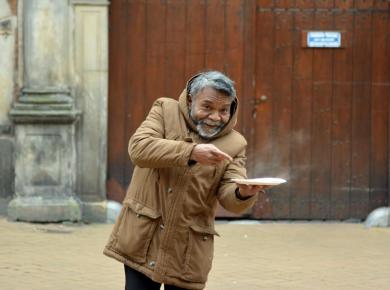Posted: November 23, 2015
Meal ministry at Dutch Mennonite church welcomes addicts and homeless
Life did not go as planned for Max Tauran. A patron of Doperse Dis (a three-year-old meal ministry in a northern Dutch city), he told the audience at a fundraising dinner that “[Life] simply went as it came…[including] chaos, mistakes, pain and sorrow.” For six and a half years, he was homeless.
Doperse Dis is a monthly meal developed out of Doopsgezind Gemeente Groningen (Groningen Mennonite Church), the Netherlands, for people who are homeless. “Warm food, warm house, warm welcome” is the event’s tagline.
Every third Tuesday of the month, some 20 volunteers prepare a three-course meal (soup, entree, dessert) for up to 80 guests. A volunteer host serves each table of 5–6 guests. “The social aspect is as least as important as the food,” says organizer Pijke.
“It’s not just the conversation and attention the volunteers give,” says Tauran. “It is the whole package of love, consideration and warmth one experiences there that gives you as a homeless person a moment to be human and to feel so.”
Officially, there are more than 800 people who are homeless in Groningen, a city of 200,000. Local social agencies reported that few offered regular meals for people who are homeless. Doperse Dis grew out of Vossestein’s desire to “[do] something with my faith…[to keep] moving forward.”
Vossestein and fellow organizers Annie and Anton van Til were already cooking for fellowship meal Mennomaaltijd once a month, so serving dinner to those who have less seemed a natural service to fill a need.
“You should not be afraid to do God’s work, even if this means inviting drug addicts,” says Vossestein. “Just start, have faith in the people you’re working with, and God will show you the way.”
Doperse Dis receives private donations and some church contributions. Every year, local politicians, university professors and church members attend a luxury fundraising dinner that helps to finance the meal. Patrons like Tauran share their story.
“A little love can give a withering flower enough strength to raise itself,” Tauran told the group. The volunteers at Doperse Dis “gave me the strength and courage to follow a better path.”
“I’ve learned that if you treat people kindly and truly see them as God’s children, almost everyone, with few exceptions, will behave accordingly,” says Vossestein.
Sint Pannekoek
A fictitious feast day has migrated from the pages of a newspaper comic to the streets of Rotterdam, and recently, to the northern Dutch city of Groningen. Sint Pannekoek (Saint Pancake’s Day), Nov. 29, is a holiday that spreads warmth, fills stomachs and makes strangers into neighbours.
Inspired by the grandfather demands for pancakes in a comic strip called Jan, Jans en de kinderen, students and local residents in Rotterdam celebrate this made-up festival by making, sharing and eating traditional Dutch pancakes.
The idea was recently adopted in Groningen. Last year, pastor Jacob Kikkert of the Mennonite church and chef Pijke Vossestein of the congregation’s outreach ministry Doperse Dis braved the brisk November weather to cook and distribute pancakes to passersby on the street. Guests from Doperse Dis also took part in the receiving and giving.
Kikkert and Vossestein are gearing up for the event again this year.
Prayers from the Doopsgezinde Gemeente Groningen
We pray for comfort for those who are homeless in shelters, in doorways and byways; lost, invisible, neglected; hungry and emotionally wounded. In Groningen, around 1,500 people are registered at shelters as homeless. Thank you for the ministry of Doperse Dis, providing a warm meal and fellowship to those who have no network of support to fall back on. With winter approaching, there is a need for gloves, socks and hats. With our human condition, there is a need for healing and community. Lord, equip your church to meet the needs of our fellow humanity.
We lament the violence and crisis in the Middle East, Africa and Europe. We pray for all the refugees, those who have lost their homes, who are hurting, with nowhere to turn. We are alarmed by the situation of those seeking asylum in the Netherlands. There is a general tendency for our governments to close borders and to stop the growing influx of refugees. We feel that our moral responsibility calls us to act: to avoid the burden and sorrow connected with giving shelter to refugees means refusing to regard violence and injustice as a common problem. Our faith that God wants unity for humankind urges us to reject inaction and instead take sides with asylum seekers. We pray for courage and wisdom to encourage local governments and institutions to meet their responsibilities. We thank God for the power of faith communities to provide support, prayer, friendship and welcome, stemming from our belief.

Join the Conversation on Social Media
FacebookTwitterInstagramFlickrYouTube